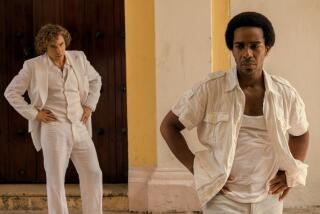Violence Becomes Racial Stereotype
Maybe it’s just me, maybe it’s just the African American men I know, but none of us has ever used a gun to right the wrongs we perceive in so-called “white” society. The article on “White Man’s Burden” (“Turnabout of Foul Play,” Calendar, March 19) and letters commenting on it (March 26) seemed to miss the real potential danger of the film, expressed in the accompanying photo, which is the assumption that any reversal of race roles automatically puts a gun in a white’s man hand, and to his oppressor’s head.
The filmmakers seem to say that if you see their movie, you’ll understand that societal pressures drive black men to violence, although millions of us find other ways to express ourselves daily. I understand that 90 minutes of John Travolta writing a letter to The Times, organizing a community protest or debating issues with friends wouldn’t sell tickets. But I have yet to punch out a white accountant for taking months to process an invoice, or blow away a white producer for putting another writer on a project instead of me.
Many poor black kids continue to be violent largely because the message they’re given is that violence is their only solution. When I was turned away at the door of a Brooklyn restaurant that naive white friends had invited me to, I did not return with a gun to exact revenge. When a white friend hailed a New York cab that ran a red light to get away when I started to get in instead, I did not open fire. When I was stopped on my way out of Bloomingdale’s after buying presents on Christmas Eve, detained and insulted by black and white security guards and told never to return--just because I had “jostled” a customer on the selling floor--I didn’t do a Colin Ferguson.
No matter what some would have us believe, black men are not all psychological pressure cookers waiting to explode. Many of us actually have the capacity to reason, to find other ways to relieve the daily pressures that will drive Travolta’s character to grab a gun. The danger of “White Man’s Burden” is not that it gives ammo to the Newt Gingriches of the world but that it allows liberals to perpetuate their own naive assumptions about minorities.
By being “understanding,” they dismiss complex social realities for the same sound-bite psychology that oversimplifies most news coverage of minority issues. We’re all much more than we’re made out to be. I look forward to “WMB,” because it sounds interesting, if overly high-concept. But its facile flip-flop could easily fall into traps that ultimately reinforce the same racist stereotypes that plague society. As we move into the new millennium, we have to work harder to understand each other.
To allow myself a sweeping over-generalization, “we” don’t want patronizing sympathy for our “oppression” any more than we want government handouts, instead of a hand up. “We” want our actual achievements seen, recognized and encouraged. The only way to achieve that is for minorities to understand that we can share fairly in the greatest weapon of our age--print and broadcast media.
Knowing how to shoot a film or video camera has proven to have more impact than any Teflon-coated bullet. Our children must learn that while a bullet can hit one head, TV, films and the printed word can hit thousands or millions, hopefully with far greater and lasting consequences.
More to Read
Only good movies
Get the Indie Focus newsletter, Mark Olsen's weekly guide to the world of cinema.
You may occasionally receive promotional content from the Los Angeles Times.










